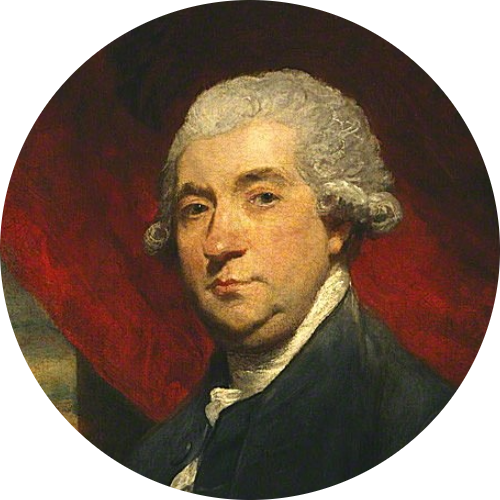Critic, poet, essayist, biographer and lexicographer, and the subject of The Life of Johnson.
Samuel Johnson was born in Lichfield on Sept 18, 1709, he was the first son of Michael Johnson (1684-1731), bookseller, and Sarah Ford (1688?-1752?). He had a brother, Nathanael, who died in his 25th year.
The greatest biography in the English language is widely accepted as being The Life of Johnson, written by James Boswell.1 While known also as an author and critic in his own time, Dr Johnson is today best known for his great Dictionary of the English Language (1755), which gave him the moniker The Great Lexicographer, as well as for being the subject of Boswell's famous biography.
The first mention of Dr. Johnson in James Boswell's writings is in his journal entry of September 21, 1762 - he writes that he finds Dr. Johnson "a man of much philosophy, extensive reading, and real knowledge". At this time they had not met but Dr. Johnson was so great a personality than one would expect his name to appear frequently in literary discussions.
Boswell had wanted to meet Johnson as early as 1760, during his first visit to London, and Samuel Derrick had promised to introduce Boswell to him. Derrick, however, did not keep his promise. When Boswell next came to London in Nov 1762 he was hoping that Thomas Sheridan could introduce him, but the former friends Sheridan and Johnson had had a fall-out. Then on Christmas Day 1762, he went to Thomas Davies' bookshop in the hope of meeting Johnson, but on this day had to content himself with meeting Oliver Goldsmith and Robert Dodsley instead.
On May 16th, 1763 - once again in Davies' bookshop - Boswell and Johnson finally met, although apparently unexpected; which is somewhat ironic considering Boswell's former attempts to get an introduction to the great Johnson. Their first meeting did not seem too promising to Boswell as Johnson first appeared to insult him for being Scottish, and secondly reprimanded him for making a comment about David Garrick on the grounds that "I have known David Garrick longer than you have done, and I know no right you have to talk to me on the subject". Afterwards, however, Davies assured Boswell that Johnson had actually rather enjoyed the meeting and that he had taken an initial liking to the young Scotsman.
Encouraged by Davies' words, Boswell, on May 24 went and called on Johnson in his lodgings - then in the Inner Temple - who received him "very courteously".2 Johnson even invited Boswell to stay after a few other companions who had been present took their leave, and the pair talked for some time about moral and religion - although Johnson probably did most of the talking, for as Boswell put it in his journal "I listened to this great Oracle with much satisfaction". On Boswell's request, they parted with Johnson promising to visit Boswell at his lodgings some evening.
The friendship between the two developed quickly from this point, and on July 14, less than two months after their first awkward meeting, Johnson - at the end of a long evening at the Mitre public house - "took me cordially by the hand; & said My Dear Boswell! I do love you very much."3
On the morning of Friday, August 5, Boswell embarked on his journey to Holland, which was followed by a Grand Tour of Europe. He did not set foot in England again until 1766. Johnson, who did not much enjoy travelling, accompanied Boswell on the Harwich Stagecoach to see him off on the boat. The coach stopped for the night at Colchester, a stopover which was made memorable by this small anecdote:
"I had teised Mr. Johnson with some fanciful apprehensions of unhappiness. A moth flew round the candle and burnt itself. The Sage [Johnson] instantly laid hold of this little incident to admonish me, saying with a sly look and in a solemn but quiet tone[,] 'That creature was its own tormentor, and I believe its name was Boswell.'"4
At Harwich, having walked around the town for a bit,
"[m]y much revered Friend walked down with me to the beach, where we embraced and parted with mutual tenderness, and engaged to correspond by lettesrs. As the Vessel put out to sea I kept my eyes upon him, for a considerable time while he remained rowling his majestic frame in his usual manner. At last I perceived him walk back into the town, and he disappeared."5
(This particular entry will be much expanded, but the expansion will follow the general chronological progress of this site. Furthermore, the entire friendship between James Boswell and Samuel Johnson is well documented in The Life of Johnson)
Most of Samuel Johnson's own writings are widely available today, both in original 18th-century editions as well as in numerous later reprints and revised editions. Best known for his Dictionary of the English Language, Johnson also wrote the Lives of the Poets (actually, "Lives of the Most Eminent English") which was a series of biographies of 52 British poets, published between 1779 and 1781.
The same goes for Hester Thrale Piozzi's Anecdotes of Samuel Johnson and Boswell's The Life of Johnson, which are also both available for free as e-books from Project Gutenberg. A search for Samuel Johnson on AbeBooks will give you a lot of results.
